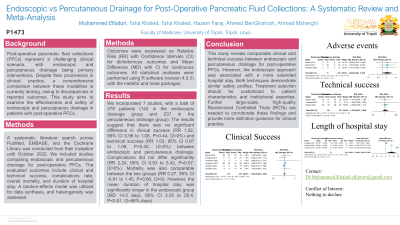Monday Poster Session
Category: Biliary/Pancreas
P1473 - Endoscopic vs Percutaneous Drainage for Post-Operative Pancreatic Fluid Collections: A Systematic Review and Meta-Analysis
Monday, October 23, 2023
10:30 AM - 4:15 PM PT
Location: Exhibit Hall

Has Audio
- ME
Muhammed Elfaituri, MBBCh
University of Tripoli
Tripoli, Tripoli, Libya
Presenting Author(s)
Muhammed Elfaituri, MBBCh, Hazem Faraj, MBBCh, Ala Elfaituri, , Ahmed BenGhatnsh, MBBCh, Ahmed Msherghi, MBBCh
University of Tripoli, Tripoli, Tripoli, Libya
Introduction: Post-operative pancreatic fluid collections (PFCs) represent a challenging clinical scenario, with endoscopic and percutaneous drainage being primary interventions. Despite their prominence in clinical practice, a comprehensive comparison between these modalities is currently lacking, owing to discrepancies in reported outcomes.
This study aims to examine the effectiveness and safety of endoscopic and percutaneous drainage in patients with post-operative PFCs.
Methods: A systematic literature search across PubMed, EMBASE, and the Cochrane Library was conducted from their inception until October 2022. We included studies comparing endoscopic and percutaneous drainage for post-operative PFCs. The evaluated outcomes include clinical and technical success, complications rate, overall mortality, and duration of hospital stay. A random-effects model was utilized for data synthesis, and heterogeneity was assessed. Outcomes were expressed as Relative Risk (RR) with Confidence Intervals (CI) for dichotomous outcomes and Mean Difference (MD) with CI for continuous outcomes. All statistical analyses were performed using R software (version 4.0.3) with the metafor and meta packages.
Results: We incorporated 7 studies, with a total of 379 patients (142 in the endoscopic drainage group and 237 in the percutaneous drainage group). The results suggest that there was no significant difference in clinical success (RR 1.02, 95% CI 0.96 to 1.08, P=0.44, I2=0%) and technical success (RR 1.03, 95% CI 0.97 to 1.09, P=0.40, I2=0%) between endoscopic and percutaneous drainage. Complications did not differ significantly (RR 2.24, 95% CI 0.93 to 5.42, P=0.07, I2=0%). Mortality was also comparable between the two groups (RR 0.27, 95% CI -0.91 to 1.45, P=0.66, I2=0). However, the mean duration of hospital stay was significantly longer in the endoscopic group (MD 14.5 days, 95% CI 3.55 to 25.4, P< 0.01, I2=96% days).
Discussion: This study reveals comparable clinical and technical success between endoscopic and percutaneous drainage for post-operative PFCs. However, the endoscopic approach was associated with a more extended hospital stay. Both techniques demonstrate similar safety profiles. Treatment selection should be customized to patient characteristics and institutional expertise. Further large-scale, high-quality Randomized Controlled Trials (RCTs) are needed to corroborate these findings and provide more definitive guidance for clinical practice.
Disclosures:
Muhammed Elfaituri, MBBCh, Hazem Faraj, MBBCh, Ala Elfaituri, , Ahmed BenGhatnsh, MBBCh, Ahmed Msherghi, MBBCh. P1473 - Endoscopic vs Percutaneous Drainage for Post-Operative Pancreatic Fluid Collections: A Systematic Review and Meta-Analysis, ACG 2023 Annual Scientific Meeting Abstracts. Vancouver, BC, Canada: American College of Gastroenterology.
University of Tripoli, Tripoli, Tripoli, Libya
Introduction: Post-operative pancreatic fluid collections (PFCs) represent a challenging clinical scenario, with endoscopic and percutaneous drainage being primary interventions. Despite their prominence in clinical practice, a comprehensive comparison between these modalities is currently lacking, owing to discrepancies in reported outcomes.
This study aims to examine the effectiveness and safety of endoscopic and percutaneous drainage in patients with post-operative PFCs.
Methods: A systematic literature search across PubMed, EMBASE, and the Cochrane Library was conducted from their inception until October 2022. We included studies comparing endoscopic and percutaneous drainage for post-operative PFCs. The evaluated outcomes include clinical and technical success, complications rate, overall mortality, and duration of hospital stay. A random-effects model was utilized for data synthesis, and heterogeneity was assessed. Outcomes were expressed as Relative Risk (RR) with Confidence Intervals (CI) for dichotomous outcomes and Mean Difference (MD) with CI for continuous outcomes. All statistical analyses were performed using R software (version 4.0.3) with the metafor and meta packages.
Results: We incorporated 7 studies, with a total of 379 patients (142 in the endoscopic drainage group and 237 in the percutaneous drainage group). The results suggest that there was no significant difference in clinical success (RR 1.02, 95% CI 0.96 to 1.08, P=0.44, I2=0%) and technical success (RR 1.03, 95% CI 0.97 to 1.09, P=0.40, I2=0%) between endoscopic and percutaneous drainage. Complications did not differ significantly (RR 2.24, 95% CI 0.93 to 5.42, P=0.07, I2=0%). Mortality was also comparable between the two groups (RR 0.27, 95% CI -0.91 to 1.45, P=0.66, I2=0). However, the mean duration of hospital stay was significantly longer in the endoscopic group (MD 14.5 days, 95% CI 3.55 to 25.4, P< 0.01, I2=96% days).
Discussion: This study reveals comparable clinical and technical success between endoscopic and percutaneous drainage for post-operative PFCs. However, the endoscopic approach was associated with a more extended hospital stay. Both techniques demonstrate similar safety profiles. Treatment selection should be customized to patient characteristics and institutional expertise. Further large-scale, high-quality Randomized Controlled Trials (RCTs) are needed to corroborate these findings and provide more definitive guidance for clinical practice.
Disclosures:
Muhammed Elfaituri indicated no relevant financial relationships.
Hazem Faraj indicated no relevant financial relationships.
Ala Elfaituri indicated no relevant financial relationships.
Ahmed BenGhatnsh indicated no relevant financial relationships.
Ahmed Msherghi indicated no relevant financial relationships.
Muhammed Elfaituri, MBBCh, Hazem Faraj, MBBCh, Ala Elfaituri, , Ahmed BenGhatnsh, MBBCh, Ahmed Msherghi, MBBCh. P1473 - Endoscopic vs Percutaneous Drainage for Post-Operative Pancreatic Fluid Collections: A Systematic Review and Meta-Analysis, ACG 2023 Annual Scientific Meeting Abstracts. Vancouver, BC, Canada: American College of Gastroenterology.
